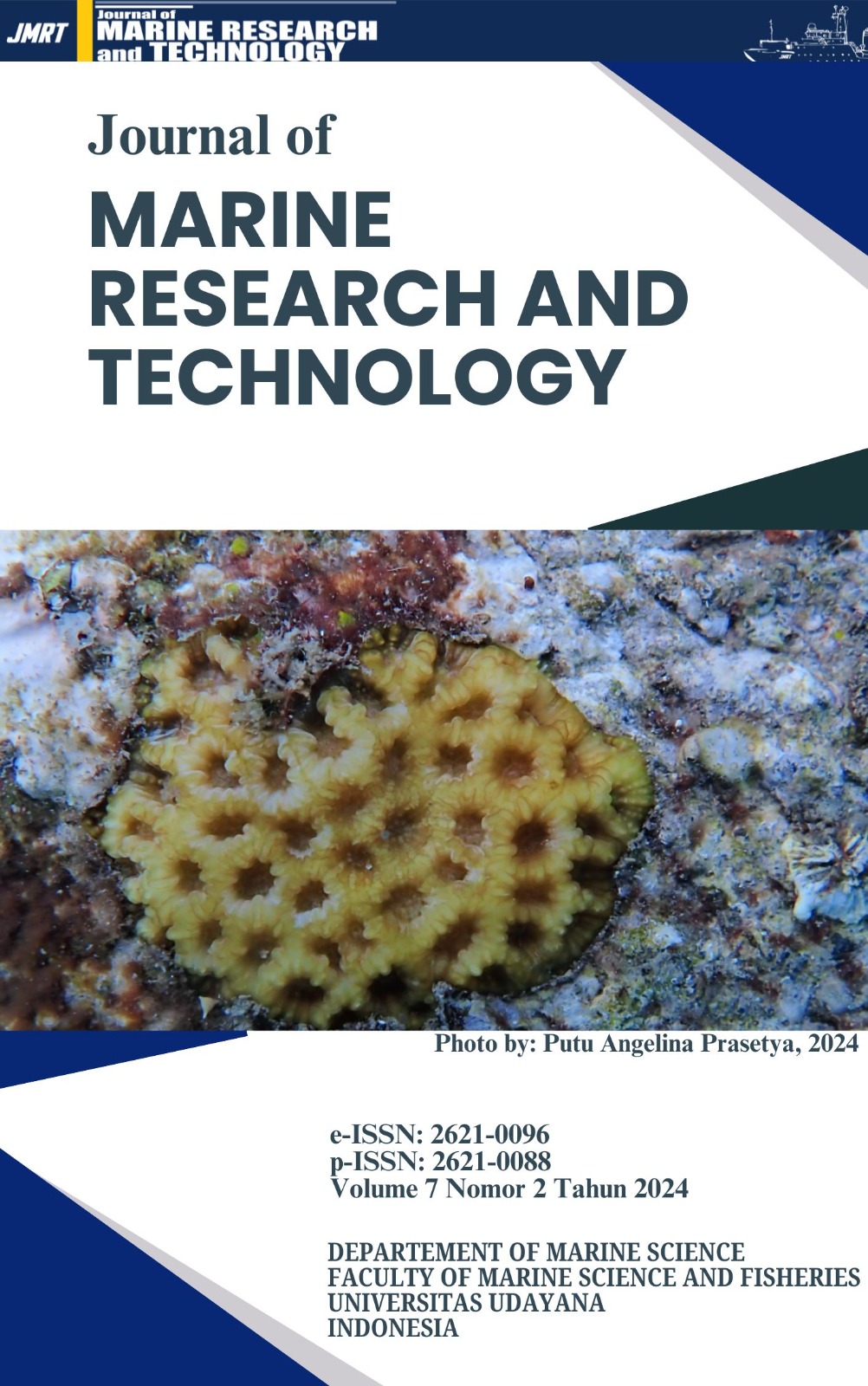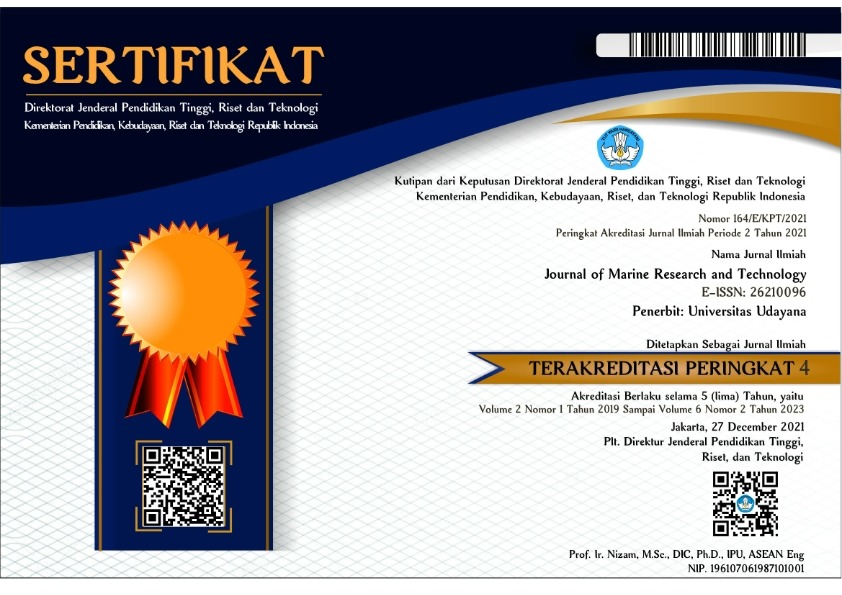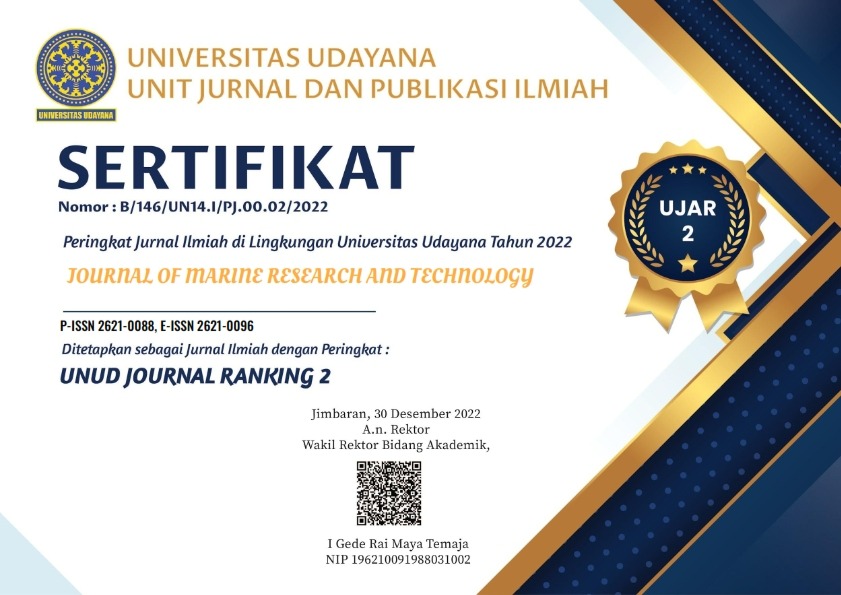Korelasi Kelimpahan Crown of Thorns Starfish (Acanthaster planci) dengan Tutupan Karang Hidup di Perairan Singaraja, Buleleng, Bali
Crown of Thorns Starfish; Peledakan Populasi; Pearson
Abstract
Ganesha Beach and Celuk Agung Beach, located in the waters of Singaraja, Bali Island, have resources for coral reefs. Previous studies showed that the corals in these waters were in moderate conditions, and The Crown of Thorns Starfish (Acanthaster planci) were found in these waters. These starfish are corallivores, meaning they eat corals. This research aimed to calculate the abundance of A. planci and coral reef cover percentage and determine the correlation. This research used the Benthos Belt Transect method to calculate the abundance of A. planci; the collected data includes the number of A. planci found, color, and type of substrate where it was found. Point Intercept Transect was used to calculate the coral reef cover percentage, and the correlations were accessed using Pearson Correlation. The area of the research is 100 m2 and has two stations. This study showed that the lowest abundance of A. planci was at station 2 at 0.004 and/m2 (normal conditions), and the highest was at 0.018 and/m2 (concerning conditions). The coral cover percentage in the research area is moderate, with the highest coral cover alive at station 1 (41%) and the lowest in station 2 (31%). The correlation between the density of A. planci and the living coral cover showed negative values, which indicates that the increasing number of A. planci will decrease the living coral cover.
Downloads
References
Birkeland, C., & Lucas, J. S. (1990). Acanthaster planci: major management problem of coral reefs. In CRC Press. CRC Press.
Byrne, M. (2011). Impact of ocean warming and ocean acidification on marine invertebrate life history stages: Vulnerabilities and potential for persistence in a changing ocean. In Oceanography and Marine Biology: An Annual Review (Vol. 49).
Caballes, C. F., Pratchett, M. S., Raymundo, M. L., & Rivera-Posada, J. A. (2017). Environmental tipping points for sperm motility, fertilization, and embryonic development in the crown-of-thorns starfish. Diversity, 9(1). https://doi.org/10.3390/d9010010
Endean, R. (1987). Acanthaster planci Investation. In B. Salvat (Ed.), Human Impact on Coral Reefs: Facts and Recommendations. Antenne Museum E.P.H.E.
Fabricius, K. (2013). Acanthaster planci. In J. . Lawrence (Ed.), Starfish: Biology and Ecology of the Asteroidea (pp. 132–141). John Hopkins University Press.
Febrianti, M. I., Purwanti, F., & Hartoko, A. (2018). Analisis Keterpaparan Ekosistem Terumbu Karang Akibat Aktivitas Pariwisata di Pulau Menjangan Taman Nasional Bali Barat. Jurnal Ilmu Dan Teknologi Kelautan Tropis, 10(1). https://doi.org/10.29244/jitkt.v10i1.19236
Giyanto, Manuputty, A. E., Abrar, M., Siringoringo, R. M., Suharti, S. R., Wibowo, K., Arbi, E. U. Y., Cappenberg, H. A. W., Tuti, H. F. S. Y., & Zulfianita, D. (2014). Panduan monitoring kesehatan terumbu karang (Suharsono & O. K. Sumadhiharga (eds.); Issue 1). CRITC COREMAP CTI LIPI Pertama.
Gomez, E. D., & Yap, H. T. (1988). Monitoring reef conditions. In Coral reef management handbook (pp. 187–195). UNESCO.
Grossman, L. (2014). The Impact of Sea Surface Temperature on Outbreaks of Acanthaster planci on the Great Barrier Reef. Scripps Senior Theses, 306pp. http://scholarship.claremont.edu/scripps_theses/306/
Haszprunar, G., & Spies, M. (2014). An integrative approach to the taxonomy of the crown-of-thorns starfish species group (Asteroidea: Acanthaster): A review of names and comparison to recent molecular data. Zootaxa, 3841(2). https://doi.org/10.11646/zootaxa.3841.2.6
Lamare, M., Pecorino, D., Hardy, N., Liddy, M., Byrne, M., & Uthicke, S. (2014). The thermal tolerance of crown-of-thorns (Acanthaster planci) embryos and bipinnaria larvae: Implications for spatial and temporal variation in adult populations. Coral Reefs, 33(1). https://doi.org/10.1007/s00338-013-1112-3
Lucas, J. S. (1973). Reproductive and larval biology of Acanthaster planci (L.) in Great Barrier Reef Waters. Micronesica, 9(2), 197–203.
Luthfi, O. M., & Iliani, R. (2020). Kelimpahan predator benthik (Acanthaster planci) di Perairan Putri Menjangan, Kabupaten Buleleng, Bali. Journal of Innovation and Applied Technology, 06(01), 931–940.
Luthfi, O. M., & Januarsa, I. N. (2018). Identifikasi organisme kompetitor terumbu karang di Perairan Pantai Putri Menjangan , Buleleng , Bali. Jurnal Kelautan, 11(1), 24–30.
Malino, P. F., & Annawaty, A. (2020). Kelimpahan Bintang Laut Mahkota Duri (Acanthaster planci L.) di Teluk Tomini, Sulawesi Tengah. Biocelebes, 14(2). https://doi.org/10.22487/bioceb.v14i2.15269
Manuputty, A. E. W., & Djuwariah. (2009). Panduan metode point intercept transect (PIT) untuk masyarakat studi baseline dan monitoring kesehatan karang di lokasi daerah perlindungan laut (DPL). COREMAP II - LIPI.
Mauliza, R., Prihadi, D. J., & Syamsuddin, M. L. (2016). Keterkaitan Kepadatan Predator Karang Bintang Laut Berduri (Acanthaster planci) Terhadap Kondisi Terumbu Karang di Perairan Pulau Batu Malang Penyu, Kepulauan Belitung. Jurnal Perikanan Kelautan, 7(2).
Prasetia, I. N. D. (2012). Rekrutmen karang di kawasan wisata Lovina. JST (Jurnal Sains Dan Teknologi), 1(2). https://doi.org/10.23887/jst-undiksha.v1i2.6037
Prasetia, I. N. D. (2015). Struktur komunitas terumbu karang di pesisir Kecamatan Buleleng Singaraja. JST (Jurnal Sains Dan Teknologi), 4(2). https://doi.org/10.23887/jst-undiksha.v4i2.6050
Pratchett, M. S., Caballes, C. F., Rivera-Posada, J. A., & Sweatman, H. P. A. (2014). Limits to understanding and managing outbreaks of crown-of- thorns starfish (ACANTHASTER Spp.). In Oceanography and Marine Biology: An Annual Review (Vol. 52). https://doi.org/10.1201/b17143
Pratchett, M. S., Caballes, C. F., Wilmes, J. C., Matthews, S., Mellin, C., Sweatman, H. P. A., Nadler, L. E., Brodie, J., Thompson, C. A., Hoey, J., Bos, A. R., Byrne, M., Messmer, V., Fortunato, S. A. V., Chen, C. C. M., Buck, A. C. E., Babcock, R. C., & Uthicke, S. (2017). Thirty years of research on crown-of-thorns starfish (1986-2016): Scientific advances and emerging opportunities. In Diversity (Vol. 9, Issue 4). https://doi.org/10.3390/d9040041
Quinn, N. J., & Kojis, B. L. (2003). The dynamics of coral reef community structure and recruitment patterns around rota, saipan, and tinian, western pacific. In Bulletin of Marine Science (Vol. 72, Issue 3).
Ruli, F., Alik, R., Polnaya, D., Nurjirana, N., Sufardin, S., & Afrisal, M. (2020). Kelimpahan Acanthaster planci dan tutupan karang hidup di Pulau Saparua, Provinsi Maluku. Jurnal Penelitian Perikanan Indonesia, 26(2). https://doi.org/10.15578/jppi.26.2.2020.125-133
Siringoringo, R. M., & Hadi, T. A. (2013). Kondisi dan distribusi karang batu (Scleractinia corals) di Perairan Bangka. Ilmu Dan Teknologi Kelautan Tropis, 5(2).
Sugiyono, D. (2010). Metode penelitian kuantitatif kualitatif dan R&D. In Penerbit Alfabeta. Alfabeta.
Thovyan, A. I., Sabariah, V., & Parenden, D. (2017). Persentase tutupan terumbu karang di Perairan Pasir Putih Kabupaten Manokwari. JURNAL SUMBERDAYA AKUATIK INDOPASIFIK, 1(1). https://doi.org/10.30862/jsai-fpik-unipa.2017.vol.1.no.1.22
Wörheide, G., Kaltenbacher, E., Cowan, Z. L., & Haszprunar, G. (2022). A new species of crown-of-thorns sea star, Acanthaster benziei sp. nov. (Valvatida: Acanthasteridae), from the Red Sea. Zootaxa, 5209(3). https://doi.org/10.11646/zootaxa.5209.3.7
Yamaguchi, M. (1973). Early life histories of coral reef asteroids, with special reference to Acanthaster planci (L.). In Biology and Geology of Coral Reefs. https://doi.org/10.1016/b978-0-12-395526-5.50019-5
Zamani, N. P. (2015). Kelimpahan Acanthaster planci sebagai indikator kesehatan karang di Perairan Pulau Tunda, Kabupaten Serang, Banten. Jurnal Ilmu Dan Teknologi Kelautan Tropis, 7(1).
Copyright Notice
The copyright to this article is transferred to Journal of Marine Research and Technology (JMRT). The copyright transfer covers the exclusive right and license to reproduce, publish, distribute and archive the article in all forms and media of expression now known or developed in the future, including reprints, translations, photographic reproductions, microform, electronic form (offline, online) or any other reproductions of similar nature.






